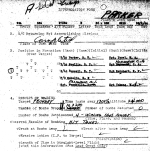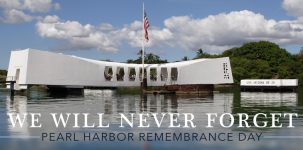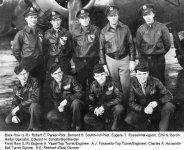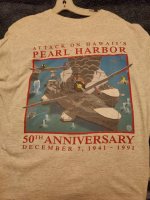-
Enter the TVWB 27th Anniversary Prize Drawing for a chance to win a Weber Traveler Portable Gas Grill! Click here to enter!
You are using an out of date browser. It may not display this or other websites correctly.
You should upgrade or use an alternative browser.
You should upgrade or use an alternative browser.
December 7 Remembrance Day
- Thread starter Erik Tracy
- Start date
Lynn Dollar
TVWBB Emerald Member
The Japanese knew they could not win a war vrs America. The thinking behind the Pearl Harbor attack was hoping to destroy the entire US Pacific Fleet and then sue for peace. Hoping the US would find itself in such a bad position that a negotiated settlement would be accepted. If the US carriers had been in Pearl that day, that plan might've worked. But by a stroke of luck, the carriers were out at sea.
And the war in the Pacific was a turning point in Naval battle strategy. It was no longer a sea war fought where battleships were the primary player. It became a carrier war, conducted by aircraft, where the ships involved never saw each other.
Losing the battleships at Pearl was not a major blow. And actually, because they were all at dock in Pearl, most were able to be salvaged. If they'd been sunk at sea, it would've been a total loss.
The Japanese strategy for the rest of the war was to obtain a negotiated settlement and they kept that idea alive all the way to the atomic bombs.
I've always thought Winston Churchill's reaction to Pearl Harbor was interesting .
And the war in the Pacific was a turning point in Naval battle strategy. It was no longer a sea war fought where battleships were the primary player. It became a carrier war, conducted by aircraft, where the ships involved never saw each other.
Losing the battleships at Pearl was not a major blow. And actually, because they were all at dock in Pearl, most were able to be salvaged. If they'd been sunk at sea, it would've been a total loss.
The Japanese strategy for the rest of the war was to obtain a negotiated settlement and they kept that idea alive all the way to the atomic bombs.
I've always thought Winston Churchill's reaction to Pearl Harbor was interesting .
No American will think it wrong of me if I proclaim that to have the United States at our side was to me the greatest joy. I could not foretell the course of events. I do not pretend to have measured accurately the martial might of Japan, but now at this very moment I knew the United States was in the war, up to the neck and in to the death. So we had won after all! … Hitler's fate was sealed. Mussolini's fate was sealed. As for the Japanese, they would be ground to powder.
Winston Churchill
The Second World War, Volume III : The Grand Alliance (1950) Chapter 32 (Pearl Harbor).
Darren Lebner
TVWBB All-Star
Winston Churchill
The Second World War
If anyone still hasn't read the books, put the set on your list.
LMichaels
TVWBB 2-Star Olympian
I still strive to learn all I can about this period of history. I find it so sad that from about the 80s on schools seem to simply gloss over this, VietNam and so on. But, having 2 uncles who fought in the naval portion (one in a Guppy class sub in the south pacific) the other on an LST also in the south pacific and both who saw lots of heavy action there, a father in law who was boots on the ground in Europe shot during the Bulge, seeing what they went through. Now watching the goings on in Ukraine and seeing much the same writing on the wall. I fear a country that due a lot to simple lack of knowledge may be doomed to repeat the same history
Lynn Dollar
TVWBB Emerald Member
I still strive to learn all I can about this period of history. I find it so sad that from about the 80s on schools seem to simply gloss over this, VietNam and so on. But, having 2 uncles who fought in the naval portion (one in a Guppy class sub in the south pacific) the other on an LST also in the south pacific and both who saw lots of heavy action there, a father in law who was boots on the ground in Europe shot during the Bulge, seeing what they went through. Now watching the goings on in Ukraine and seeing much the same writing on the wall. I fear a country that due a lot to simple lack of knowledge may be doomed to repeat the same history
Its an undertaking, because its about 2,300 pages in three volumes, but Ian Toll's triology is great. I eased into it with the " Pacific Crucible " and I got 100 pages deep in and bought the other two volumes . But I looked at the Pacific War from entirely different perspective after reading all three.
https://www.amazon.com/dp/0393343413/?tag=tvwb-20
There's a new promising podcast, " We Have Ways USA " . Its a take off from a podcast by British historian James Holland and a Brit comedian Al Murray, whose well versed in UK WW II history. They've been very much European Theatre centric, of course, being in the UK. But just recently they've started a USA version , with US historian John McManus. Holland has been wanting to spend more time on the Pacific War, he takes the podcast in that direction occasionally but Murray won't go along very far , till Murray changes the subject back to Dunkirk or El Alamein or some other strictly British subject,
They just finished two episodes on Douglas MacArthur.
https://open.spotify.com/show/34VlAepHmeloDD76RX4jtc
I've read two of McManus's books, " Deadly Sky " about the 8th AF in the UK and " September Hope " about Operation Market Garden. Hopefully, we get more podcasts on the Pacific.
Bob Bailey
TVWBB Gold Member
I'll Never forget! My Dad was a Navy Veteran and Pearl Harbor survivor (USS Pennsylvania, BB-38). Something we were always very proud of. I met many of his former shipmates over the years. These were truly proud, brave and patriotic men. Not too many of them remain. God bless their souls.Never Forget!
View attachment 63717
Erik Tracy
TVWBB All-Star
I just watched a 2hr documentary on the History Channel: Pearl Harbor 24 Hours Later
A really good, compelling, informative show on how events unfolded in the US after the attack.
A really good, compelling, informative show on how events unfolded in the US after the attack.
Steve Hoch
TVWBB Olympian
Lew Newby
R.I.P. 1/26/2024
My Dad and the family members in his generation all served in the Pacific, either as Navy or Marines. As a youngster I pestered them with questions about the war. Sometimes they would open up and at other times they didn't want to go where I wanted to go. I grew up admiring them and as I got older I respected them more and more. When I came back from Vietnam I finally understood them and their generation is, deservedly, called "The Greatest Generation". All of them have passed on but I still remember the vivid pictures they drew with their words. They will always be my heroes.
Darren Lebner
TVWBB All-Star
My grandfather was a B-17 pilot in the 8th air force during the war. This is a picture of him with one of his crews.
G-d bless them all!
I think I know of one bomb crew member (don't recall position) who is still alive. From what I recall reading, he wrote that, after his full "quota" of missions, he returned home. The next bombing flight out, the plane he flew in was shot down.
I assume you've seen this:

Darren Lebner
TVWBB All-Star
My grandfather was a B-17 pilot in the 8th air force during the war.
The Joltin' Joe!
44-8709 | American Air Museum
Steve Hoch
TVWBB Olympian
I have not seen that document, but I do know that it refers to a mission he would have flown. He married my grandmother just before this and shipped out. My mother was born in October of that year. My grandfather was subsequently shot down for the first time probably not long after this mission. He was able to somehow make it back to England and continued flying missions. When he finally came home he had achieved the rank of Major at the age of 23. He did not like to talk about what he went through like most of the great men and women that served in that war. Most of what I know about him was related to me by my father from late night drinking that they both partook in when I was a child. Thanks for posting this Darren, I appreciate it.G-d bless them all!
I think I know of one bomb crew member (don't recall position) who is still alive. From what I recall reading, he wrote that, after his full "quota" of missions, he returned home. The next bombing flight out, the plane he flew in was shot down.
I assume you've seen this:
View attachment 63736
Darren Lebner
TVWBB All-Star
I have not seen that document, but I do know that it refers to a mission he would have flown. He married my grandmother just before this and shipped out. My mother was born in October of that year. My grandfather was subsequently shot down for the first time probably not long after this mission. He was able to somehow make it back to England and continued flying missions. When he finally came home he had achieved the rank of Major at the age of 23. He did not like to talk about what he went through like most of the great men and women that served in that war. Most of what I know about him was related to me by my father from late night drinking that they both partook in when I was a child. Thanks for posting this Darren, I appreciate it.
I believe it was the last mission he flew, mission 198 on Aug. 25, 1944. He is indeed listed for this mission as WIA.

August 1944 Mission Reports — The 95th Bomb Group (H)
Casualties: Mission #186 R.O. Baber 7 KIA; 3 POW Mission #188 R.W. Hamilton 1 KIA; 8 POW Mission #194
Darren Lebner
TVWBB All-Star
Steve Hoch
TVWBB Olympian
Well, you are apparently a lot better at finding this information than I am, I have looked. So you are saying this was his last mission? That's extremely interesting.I believe it was the last mission he flew, mission 198 on Aug. 25, 1944. He is indeed listed for this mission as WIA.

August 1944 Mission Reports — The 95th Bomb Group (H)
Casualties: Mission #186 R.O. Baber 7 KIA; 3 POW Mission #188 R.W. Hamilton 1 KIA; 8 POW Mission #19495thbg.com
Darren Lebner
TVWBB All-Star
I believe it was the last mission he flew, mission 198 on Aug. 25, 1944. He is indeed listed for this mission as WIA.

August 1944 Mission Reports — The 95th Bomb Group (H)
Casualties: Mission #186 R.O. Baber 7 KIA; 3 POW Mission #188 R.W. Hamilton 1 KIA; 8 POW Mission #19495thbg.com
I was wrong. Far from last mission.
Darren Lebner
TVWBB All-Star
His last mission was in 3/45, about 2 months before VE day.
Steve Hoch
TVWBB Olympian
I didn't know he did 30, thanks again for uncovering that!His last mission was in 3/45, about 2 months before VE day.
Darren Lebner
TVWBB All-Star
But he's listed as WIA in mission 198, while others were KIA.
He is indeed listed for this mission as WIA.

August 1944 Mission Reports — The 95th Bomb Group (H)
Casualties: Mission #186 R.O. Baber 7 KIA; 3 POW Mission #188 R.W. Hamilton 1 KIA; 8 POW Mission #19495thbg.com
I misread the statistic. On mission 198, one unknown flight member of your grandfather's bomber was WIA. The statistics do not specify which crew members they are referring to,



